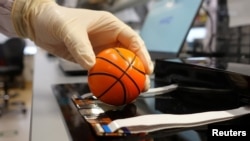Singapore researchers say they have developed a form of “electronic skin” that can recreate a sense of touch.
The developers hope their invention will give people with prosthetic hands the ability to identify different objects.
A team from the National University of Singapore created the skin device, which measures 1 square centimeter. The system contains 100 small sensors that attempt to recreate things like texture, temperature and even pain.
The researchers call the device Asynchronous Coded Electronic Skin, or ACES. They say it can process information faster than the human nervous system.
Machine learning methods trained the device to recognize 20 to 30 different textures. It can even correctly read Braille letters 90 percent of the time, the developers say.
Research team leader Benjamin Tee told the Reuters news agency that the system does not require movement to work. “Humans need to slide to feel texture. But in this case the skin, with just a single touch, is able to detect textures of different roughness.”
A demonstration showed that the device could identify the difference between a soft, squishy ball and a solid plastic one.
“When you lose your sense of touch, you essentially become numb... and prosthetic users face that problem,” Tee said. “So by recreating an artificial version of the skin, for their prosthetic devices, they can hold a hand and feel the warmth and feel that it is soft… ”
Tee said his idea for the device came partly from the movie Star Wars, when character Luke Skywalker loses his right hand and it is replaced with a robotic one. In the film, the new hand is able to experience touch sensations just like the real one.
The artificial skin technology is still going through experiments and development. But Tee said there had already been a lot of interest in the system, especially from the medical community.
Tee said similar inventions that his team has developed include see-through skin that can repair itself when torn and a material for wearable electronic devices that gives off light.
I’m Bryan Lynn.
Reuters reported this story. Bryan Lynn adapted the report for VOA Learning English. Ashley Thompson was the editor.
We want to hear from you. Write to us in the Comments section, and visit our Facebook page.
________________________________________________________________
Words in This Story
prosthetic – n. an artificial device that replaces a missing or injured part of the body
texture – n. the way something feels when you touch it
Braille – n. a form of written language for blind people, in which characters are represented by patterns of raised dots that are felt with the fingertips.
detect – v. discover or notice something
squishy – adj. soft when pressed
numb – adj. unable to think, feel, or react normally because of something that shocks or upsets you
character – n. a person who appears in a story, book, play, movie, or television show





